At last week’s Research Café, hosted by Pro Vice-Chancellor of Research Professor Chris Turney, we explored how UTS research teams are matching industry sector knowledge and insights with our internal research expertise and capabilities.
Deep sector engagement
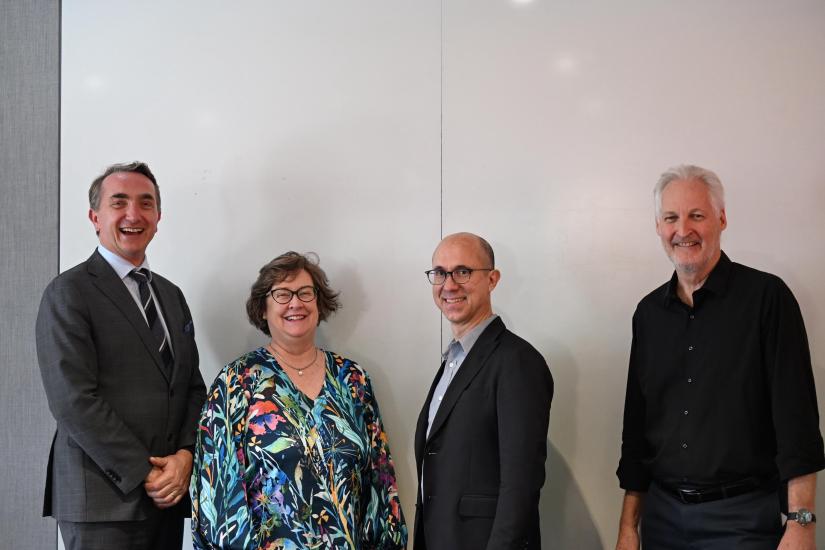
(from left to right) Pro Vice-Chancellor of Research Professor Chris Turney, Business Development Manager for the Faculty of Health Karyn Joyner, Director of UTS Tech Lab Professor Robert Fitch, Director for the Institute of Sustainable Futures Professor Stuart White
Around two-thirds of UTS research directly involves end users, either as funders and/or collaborators. Across our diverse research portfolio are areas of critical mass and capability that align well with specific industry sectors.
These kinds of alliances create long-term and sustainable value to our researchers, our partners, and most importantly, to society through the impact and benefit our research creates and enables. Key to this deep sector engagement is UTS’s commitment to genuinely understanding the way relevant sectors operate, now and into the future.
The Director of UTS Tech Lab, Professor Robert Fitch, opened the session by speaking about how deep sector engagement is a skill that can be learned and the importance of problem-solving skills.
Business Development Manager for the Faculty of Health, Karyn Joyner, then discussed how the Faculty of Health’s engagement framework informs strategic industry partnerships, including through Innovative Solutions for Well-being and Health (INSIGHT).
Director for the Institute of Sustainable Futures, Professor Stuart White, concluded the session by speaking about deep sector engagement in the context of sustainability and climate.
A skill that can be learned
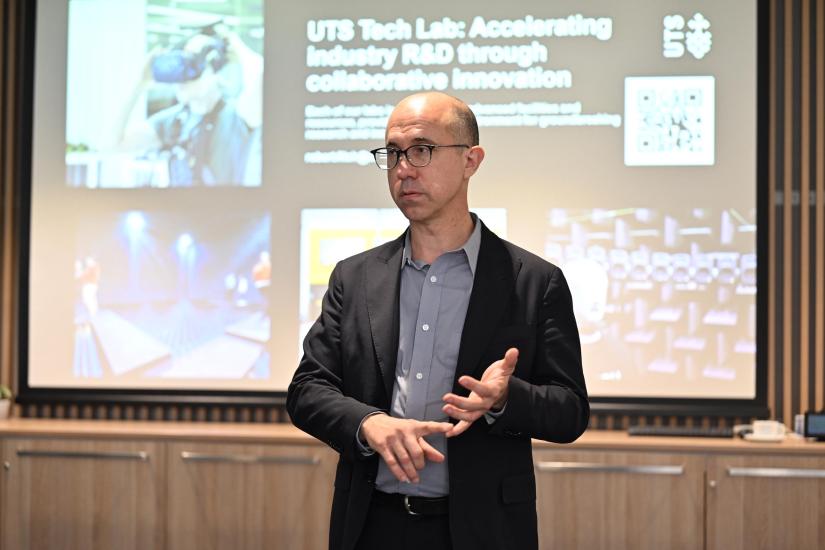
In highlighting how deep sector and industry engagement are skills that can be learned, Robert shared experiences from his own career. He mentioned the value of having had fantastic mentors, including the NSW Chief Scientist and Engineer Professor Hugh Durrant-Whyte, and participating in a wide range of activities from individual research projects to being a CTO and building up a successful robotics company.
“In all those cases, there's never been one where the problem that we started with was the problem we ended up solving. It needs discussion back and forth with whoever you're engaging to dial into that,” Robert said.
He emphasised the value of problem-solving skills in the research life cycle and how crucial they are for successful industry engagement.
“What you need to do, from an academic's perspective, is learn how to use those problem-solving skills that you've finely tuned over your career and apply them towards interrogating the problem that is at hand to get to the bottom of it. The ultimate goal is to ask the right questions to bring it full circle. That's the scientific method,” he said.
In all those cases, there's never been one where the problem that we started with was the problem we ended up solving.
Robert concluded by discussing the critical feedback loop that is created between industry problems and theoretical problems and how this can lead to significant research impact.
Connect with Robert and discover Tech Lab.
An engagement framework
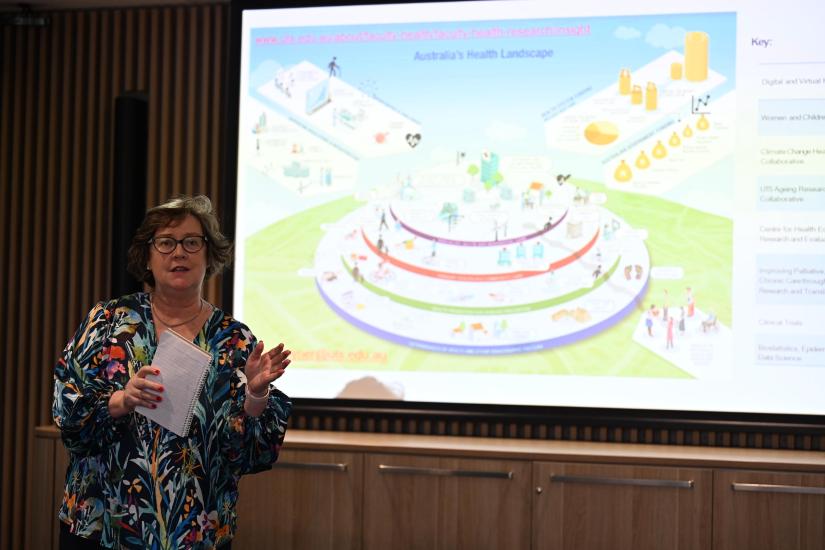
Karyn spoke about the importance of having a strategic approach to how we engage with industry. She discussed the challenges of developing high-value, strategic partnerships in health and the way deep sector engagement should underpin any engagement framework.
The framework developed by INSIGHT for example is based on analysis and benchmarking of the Australia’s entire health landscape. It looks at how we engage as a university and allows academics to evaluate where they are positioned and where they want to get to in a certain timeframe.
Karyn identified the importance of really listening to stakeholders to forge industry partnerships that can also lead to many new research opportunities.
“Listening, really listening, and understanding. It's amazing how many relationships I've been able to convert from a researcher and clinician relationship to a C suite relationship encouraging them to think about how the whole of UTS can help them,” she explained, adding that we can work with a partner to explore a whole range of different ways a university can support the health industry.
“A deep engagement approach unfolds masses of projects that allow you to think about research opportunities as well as implementation and evaluation opportunities. Listening carefully allows you to have whole of university engagement discussions.”
Karyn spoke of how transdisciplinary solutions and reciprocal advocacy can lead to impactful research and strategic partnerships and how she references the research ecosystem and integrates it into conversations with potential partners. This can lead to knowledge generation, knowledge exchange, research translation and greatly enhanced research impact.
It just unfolds masses of projects that allow you to think about research opportunities, implementation opportunities, evaluation opportunities. Listening carefully allows you to have whole of university engagement discussions.
“If the university is really looking for deep sector engagement and sustainable relationships to have the greatest impact, we've got to think strategically about where we're going to position ourselves,” Karyn said.
Connect with Karyn and discover INSIGHT.
Building sustainable futures
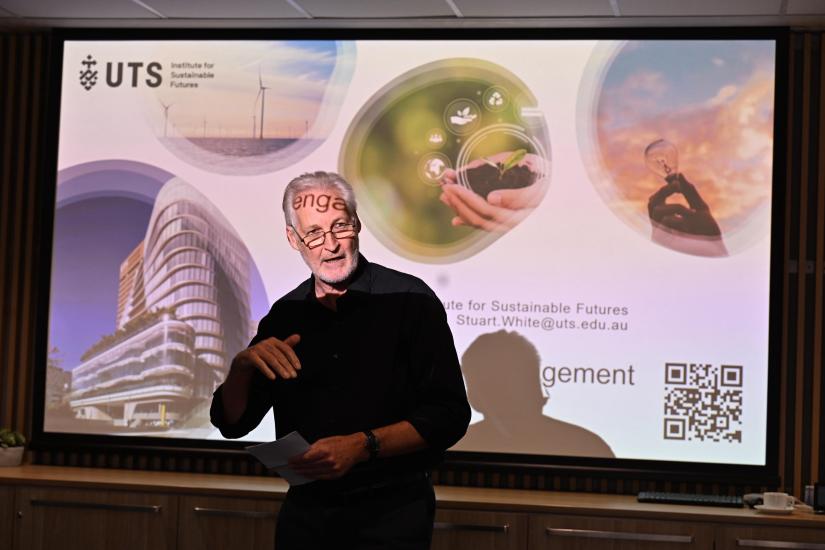
Stuart identified three characteristics to deep sector engagement: it is stakeholder-led, there is an identified path to impact, and the third is that it is pan-institutional, or cross-UTS.
“We need to know who we are. We need stakeholders to be able to find us. We need to project that, and we need to deliver, and make sure we deliver well on whatever we promise to those stakeholders,” Stuart said.
“To that end, when we're looking at research projects in relation to climate change, we are potentially looking at how we can improve the level of collaboration and how we can provide the best methods of systems innovation internally at UTS in order to do exactly that.”
Stuart spoke about how the Institute of Sustainable Futures has worked with partners such as Climate-KIC Australia to create the Business Renewables Centre Australia, fine examples of deep and strong outreach into the stakeholder landscape.
He pinpointed the Institute’s focus on distributed energy resources, now called consumer energy resources. With partnerships including the Faculty of Law looking at regulatory issues, and the Centre for Social Justice and Inclusion on projects in Glebe with Bridge Housing and the First Nations Clean Energy Network looking at jobs and the role of land in renewable transition, this research is taking a cross-university approach.
“The path to impact means looking at what are the policy changes, looking at the solutions, building solution multiplying solutions, rather than problem multiplying solutions,” Stuart said.
The path to impact means looking at what are the policy changes, looking at the solutions, building solution multiplying solutions, rather than problem multiplying solutions.
Stuart touched briefly on the tough times currently faced by universities and the opportunity and need for a new approach.
“There's a Chinese character, wei ji, that combines two meanings, the word crisis and opportunity, or a fork in the road. And I think that's where UTS can be. This is where deep sector engagement provides an opportunity to deal with the very crisis that we have, through deep sector engagement, generating increased research income and activity and having greater impact for good”
Connect with Stuart and discover the Institute for Sustainable Futures.
Join the Research Cafe
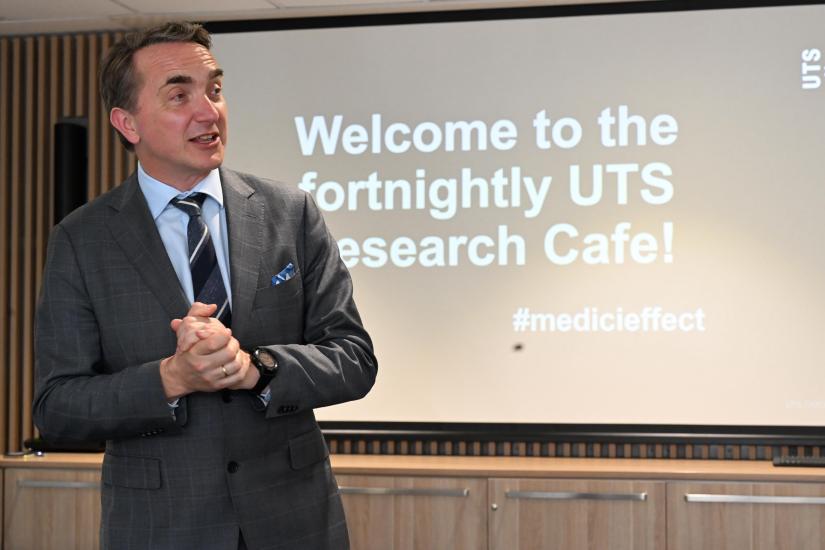
Held every second Wednesday in the RES Hub events space, Research Café is an informal opportunity for the UTS Research Community to share ideas, make connections and explore opportunities for collaboration. Send an email to reshub@uts.edu.au to be added to the standing invitation.